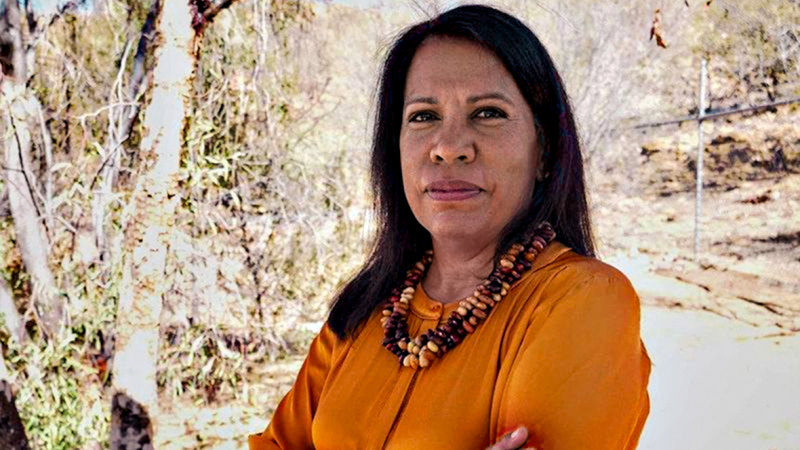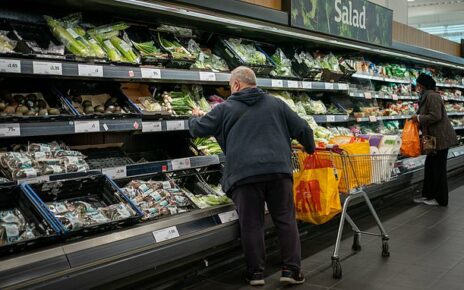Save articles for later
Add articles to your saved list and come back to them any time.
Advocates for the so-called progressive No vote on the Voice referendum are putting lives at risk, says a senior figure at the Central Land Council, pointing to the urgent needs of remote Aboriginal communities.
While the Yes and No cases have largely drawn support from the traditional left and right, respectively, some figures on the left, notably Senator Lidia Thorpe, have advocated a No vote on the looming referendum on grounds including that other measures, such as a treaty, should come first.
Central Land Council executive director of policy Josie Douglas says the Voice “is the mechanism for achieving what many people in remote communities want”.
Josie Douglas, a Wardaman woman and executive director of policy at the democratically elected council, said there was “no such thing” as a progressive No vote.
“History won’t distinguish between a progressive No or a hard, conservative No,” Douglas told this masthead.
“Voting No is voting for the status quo, and we know that business as usual isn’t working. Indigenous people have been knocked from pillar to post for 235 years. We’ve been betrayed so many times in the past, over many generations, and this is such an important opportunity.”
She said the “loudest voices” advocating for the progressive No position often had “little practical experience” of service delivery.
‘Voting No is voting for the status quo, and we know that business as usual isn’t working.’
The Central Land Council is the representative body for more than 30 major remote Aboriginal communities and more than 100 homelands and outstations, across 777,000 square kilometres of central Australia in the southern half of the Northern Territory.
Douglas said the council’s communities were among the most marginalised and disadvantaged in Australia.
“Report after report, royal commission after royal commission, [but] things are not improving in many of our communities across many social determinants … The data shows that poverty is increasing in central Australia, that employment outcomes are worsening, that school attendance is going backwards and is at an all-time low,” she said.
“These are the everyday challenges that Aboriginal people here – and more generally – want to see improvements in. These are the matters that are important to everyone, but particularly for people in remote communities, these issues are writ large.
“The Voice to parliament is the mechanism for achieving what many people in remote communities want, and that’s a greater say over the policies and laws that are impacting their everyday lives.”
Douglas’ comments follow Thorpe’s National Press Club address on Wednesday, in which she described the Voice to parliament as a “false hope” and a “powerless advisory body”, and called for the referendum to be cancelled.
Thorpe, a DjabWurrung-Gunnai-Gunditjmara woman, claims to lead a Blak Sovereign Movement that opposes the Voice proposal.
Douglas said people in remote communities wanted better education outcomes, housing, employment opportunities for young people, and more control over what is happening in their lives and communities.
“The [Voice is a] mechanism that gives them a greater say over the policies and laws that are impacting their everyday lives,” she said.
“We have public servants and bureaucrats driving in and out of remote communities in large numbers, and it is this very bureaucracy that is largely responsible for the failings of policies that have created harm for generations of people.
“In terms of policy advice, why not get it from the very people who have the lived experience, and who have the solutions to the challenges that people are facing?”
Douglas, who is in charge of the council’s anthropology, legal and mining teams, in addition to policy, says leaders within the remote communities keep saying future generations will be “committed to the same grind” if the current policymaking processes are maintained.
“We keep saying the same thing, and nobody is listening,” she said.
The Aboriginal Advancement League, the oldest continuing Aboriginal organisation in Australia, has become the latest Aboriginal community body to back the Yes campaign, as polls indicate public support for the Voice has fallen in recent weeks.
In a statement on Thursday the Melbourne-based group, in its 66th year, urged the public to help make the Voice a reality, “because if governments listen to Aboriginal people, programs and policies will be implemented that will improve our lives”.
The league was one of the loudest advocates for the 1967 referendum that attracted the support of 93 per cent of voters to allow the government to legislate for Aboriginal and Torres Strait Islander people.
“While I’m here, I’ll battle for that same legacy for our mob,” said chief executive Esme Bamblett, a Bangerang, Taungurung and Wiradjuri woman.
With Rachel Eddie
Cut through the noise of federal politics with news, views and expert analysis. Subscribers can sign up to our weekly Inside Politics newsletter here.
Most Viewed in National
From our partners
Source: Read Full Article


